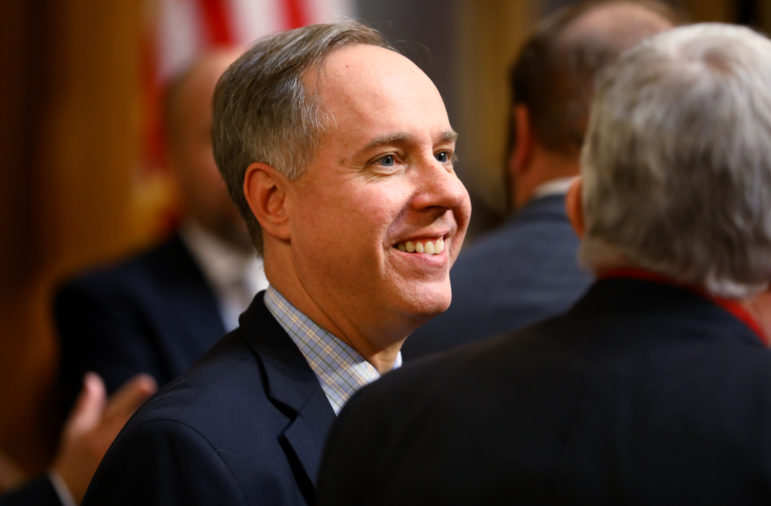State’s Loss on Federal ACA is $1.3 Billion
State loses $1.3 billion in federal funds for medical care under Republican two-year budget.
The debate over whether to accept federal funds to expand Medicaid in Wisconsin have revolved around how much money would be lost to the state budget, which has been estimated at about $180 million per year. But this is only the money state taxpayers would spend to replace some of the federal Medicaid funding; had all the federal medical care dollars been accepted, Wisconsin would gain about $1.3 billion over two years.
That’s according to an analysis by the liberal Wisconsin Budget Project. But the non-partisan Legislative Fiscal Bureau came up with a figure very close to that: a total of $1.28 billion in lost federal dollars, the LFB told Urban Milwaukee, versus $1.297 billion by the Wisconsin Budget Project.
That number, it appears, had always been available in the LFB analysis, but the media has concentrated on the loss to the General Purpose Revenue state budget, without looking at the cost of additional medical care that would be lost by not accepting the federal expansion dollars. Gov. Tony Evers budget accepted the federal funds and the recently passed Republican version of the budget turns down the funds.
The lost funding, Hintz noted, could have helped fund health-related problems “such as the opioid crisis where we are seeing overdoses continue to increase and Wisconsin ranks 49th in its response.” Instead he notes, all Wisconsinites who pay federal taxes “are forced to pay for the health care of those living in the 37 other states that chose to get their share of federal Medicaid funds.”
The map of states refusing Medicaid expansion dollars under the federal Affordable Care Act shows Wisconsin is an anomaly, the only place outside of western and southern states still opposing expansion. Besides those 37 states accepting the money, the District of Columbia has also opted to do so. Even in deep-red states like Idaho, Nebraska and Utah, November ballot initiatives were approved to accept the funding. In Wisconsin an April Marquette Law School poll found 70 percent of respondents supported accepting the money versus 23 percent who did not.
The analysis for the Wisconsin Budget Project by longtime budget cruncher Jon Peacock shows that Evers’ two-year budget proposed expanding coverage to adults with incomes of up to 138 percent of the federal poverty level, which for a single adult without dependent children is an income of $17,236 per year or $8.29 per hour in full-time pay. “That change would enable an estimated 82,000 adults to be covered in BadgerCare [Wisconsin’s version of Medicaid], and it would qualify Wisconsin for 90% federal reimbursement for the coverage of all childless adults – including 148,000 childless adults with incomes below the poverty level who now participate in BadgerCare.” That 90 percent reimbursement rate under the ACA version of Medicaid compares to the current rate of only 59 percent of the costs, which creates a huge loss of dollars for the state.
And Wisconsin would also get more federal funding — about $200 million — for a program that provides assistance to acute care hospitals. The grand total of dollars lost to the state is $1.297 billion, Peacock found. The Republican budget spends $322 million in GPR revenue to make up for some of this lost federal funding, whereas the Evers budget accepts the federal funds and spent none of that $322 million in state taxes.
Jon Dyck, Supervising Analyst for the Legislative Fiscal Bureau says Peacock’s analysis is correct save for a discrepancy in how senior care is analyzed, which brings the total lost federal funds over two years to $1.280 million. The LFB analysis is part of a broader run-down of all differences between the two budgets.
Assembly Speaker Robin Vos (R-Rochester) and Republican Senate Majority Leader Scott Fitzgerald (R-Juneau) declined to respond to Urban Milwaukee for comment on these findings. Fitzgerald had suggested he was open to negotiations over accepting the federal expansion dollars, but Vos has adamantly opposed this.
Vos has talked about running for governor in 2022, which may help explain his stand, Hintz charges: “There is no policy reason to turn away this funding. Instead, this is a political tactic to thwart the governor’s ability to get a win.”
The LFB has estimated that state taxpayers lost $1.1 billion since 2014 because Walker and the Republicans rejected the Medicaid expansion dollars. But this new analysis on total dollars for medical care that would have gone to the state suggests the total loss to Wisconsin is much higher than that. By changing course in his approach to this issue Vos would be open to charges he cost the state billions of dollars in lost medical care, hardly a great start to a run for governor.
The Wisconsin Hospital Association and Wisconsin Medical Society, have urged Republicans to support Evers’ approach. Accepting the Medicaid expansion funding would have delivered $200 million in assistance to acute care hospitals over the next two years. There, too, the total loss since 2014 would be far higher.
“Obstructionist Republicans have done everything in their power to limit access to affordable health coverage,” Senate Democratic Leader Jennifer Shilling (D-La Crosse) told Urban Milwaukee. “It is foolish to reject money that can be used to address the opioid epidemic, improve access to dental and mental health care, and increase funding for nursing home and dementia care specialists. The Republican refusal to accept federal funds will end up costing the state more money while covering fewer people. Wisconsin families deserve better.”
If you think stories like this are important, become a member of Urban Milwaukee and help support real independent journalism. Plus you get some cool added benefits, all detailed here.
Murphy's Law
-
Top Health Care Exec Paid $25.7 Million
 Dec 16th, 2025 by Bruce Murphy
Dec 16th, 2025 by Bruce Murphy
-
Milwaukee Mayor’s Power in Decline?
 Dec 10th, 2025 by Bruce Murphy
Dec 10th, 2025 by Bruce Murphy
-
Total Cost of Foxconn Is Rising
 Dec 8th, 2025 by Bruce Murphy
Dec 8th, 2025 by Bruce Murphy





















